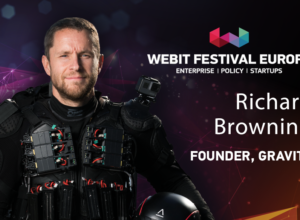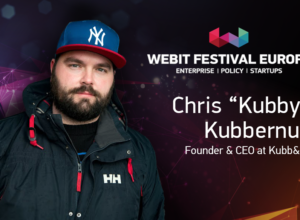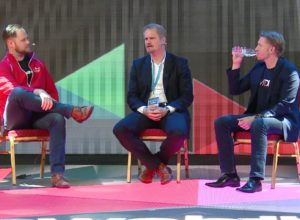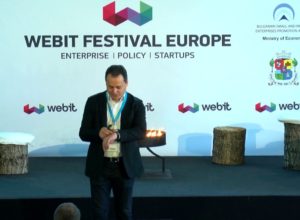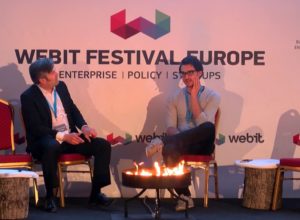Tag: Webit
Real-life Iron Man – Richard Browning joins Webit in June 2018
Here you can see a full list of the confirmed speakers at Webit.Festival Europe 2018, while here you can get all the information you need about the tickets for the event.
Removing the fiction from science-fiction, the UK-based inventor has thrown away the rule book with his suit powered by six small jet engines. Founder of human propulsion technology start-up, www.Gravity.co, Richard (The real-life Iron Man) has pioneered his innovative idea into a reality, taking flight in Spring 2017.
Richard's vision is to build Gravity into a world class aeronautical engineering business, challenge perceived boundaries in human aviation, and inspire a generation to dare ask ‘what if…’. https://www.youtube.com/watch?v=JinhIHIF8Eo“The dream was to re-imagine an entirely new authentic form of human flight leaning on an elegant collaboration of mind and body augmented by leading edge technology. Gravity has to date been experienced by over a billion people globally with video views alone running at more than 60M within 7 days of launch.”
Richard also broke the record for fastest speed in body-controlled jet suit – he reached 32.02 mph and made his mark in the pages of Guinness World Records. He hopes that in the future he will smash it again.“The way you have to balance is pretty much the same stance Tony Stark has in the film,” Browning says.
Browning says that this is just the beginning of this technology journey. The next big thing his company is planning is adding wings to the suit, that will allow the person wearing it, to fly further, faster and higher and also use a lot less fuel than now.“As the engine starts pulling up, it starts to build you can sense the energy and the moment the ground leaves your feet and you’re actually in the air it’s a pleasure and joy.”
Nobel Peace Prize Laureate Tawakkol Karman joins Webit to discuss how...
Here you can see a full list of the confirmed speakers at Webit.Festival, while here you can get all the information you need about the tickets for the event.
As today’s world keeps changing at an accelerating pace, one can only expect to see significant breakthroughs in the fields of digital and innovations that will hopefully change our live for the better.
Tawakkol Karman is a human rights activist, journalist and 2011 Nobel Peace Prize laureate. She was crowned the Mother of the Yemeni Revolution in recognition of her prominent role in advocating and leading the 2011 revolution. She was also named the Lady of the Arab Spring because of her attitudes against the authoritarian regimes and counter-revolutions in the Middle East. In 2005, Karman founded Women Journalists Without Chains (WJWC) to defend press freedom and to combat human rights violations. She holds many positions and titles, most notably as follows: 1. Member of FAO-Nobel Laureates Alliance for Food Security and Peace 2. Member of the UN post-2015 High-Level Panel 3. Member of Transparency International’s Advisory Council 4. Member of Executive Board of Nobel Women's Initiative 5. Member of the Advisory Board of the World Education Organization This will be her first time visiting Sofia and she shared her expectations of the city and Webit:"I am so thrilled to have a chance to visit Sofia that combines beauty and deep-rootedness. For the festival, I expect it will be successful. The world everyday witnesses new ideas and innovations, and the digital world does not seem to stop at a certain point. As today’s world keeps changing at an accelerating pace, one can only expect to see significant breakthroughs in the fields of digital and innovations that will hopefully change our live for the better and show how to make the most of technology. Despite all the drawbacks, technology has made our lives easier and allowed us to accomplish our projects as fast as possible and at the lowest possible cost."
Tawakkol Karman was one of the first voices calling for the departure of Saleh's dictatorial regime, and she had always been firmly convinced of the need to achieve this goal as clearly expressed in her different articles during the pre-2011 period such as the one published by Al-Thawri newspaper, the mouthpiece of the Yemeni Socialist Party, on September 27, 2007. Therein, she called for a popular peaceful uprising throughout Yemen to overthrow the then existing regime to be replaced by a full democratic system."In normal circumstances, it may be hard to find an activist who does not engage in or interact with politics. But in difficult circumstances of some countries, such as Yemen, which witnessed a popular youth revolution in 2011, followed by a political movement followed by a counter revolution and several internal and external wars, it is very difficult for an activist to remain away from politics.
Many activists have been involved in politics in the hope of bringing about a change in existing policies, but I do not know if they have succeeded in doing so. The problem lies in regimes, which deal with different issues in their own way.
On the personal level, I have not yet decided to engage directly in politics. All I do is criticize and oppose the wrong policies from my own perspective as a human rights activist and defender."
Bold and outspoken, Karman has been imprisoned on numerous occasions for her pro-democracy and pro-human rights protests. Among Yemen’s youth movement, she is known as “mother of the revolution”, “the iron woman”, and “the lady of the Arab spring”. She has organized and participated in countless activities and written articles, calling for abandonment of despotism, extremism, violence and terrorism, for dialogues between religions and sects and for co-existence between peoples, cultures and civilizations."Tawakkol Karman is a young Yemeni woman who is a very strong defender of human rights inside and outside her own country. She always tells the truth despotic regimes do not like to hear. I practiced journalism, and I realized early on the importance of press freedom to make journalism play its role in disseminating information to the public and monitoring the performance of the authority. I founded NGO “Women Journalists Without Chains” that dedicated to defending media outlets and journalists and demanding the repeal of anti-freedom laws, training and qualifying journalists and human rights activists to do their jobs properly. In everything I do, I always make sure that I am the voice of freedom and the voice of the people, and therefore I oppose any governmental or non-governmental policy that does not care about interests and dignity of people. I have a dream of ending injustice everywhere, I feel sympathy for all the oppressed on this planet."
Since as early as 2007, the longtime activist for human rights and freedom of expression had been able to organize hundreds of protests, sit-ins and solidarity events, as well as campaigned for women’s rights and ending harassment of journalists. All of this became a source of inspiration for citizens to reject injustice and show solidarity without fear of influential and the security services."Journalists in the Arab region go through the most difficult times, as repressive regimes carry out arrests among them and enact laws and legislation to restrict their freedoms and independence. I believe it is not possible for a free press to be there in dictatorial countries. In case we are to overcome the obstacles journalists face, we must first overthrow tyranny and its laws. I would like to point to the double suffering of Arab journalist as both authoritarian governments and terrorist groups do not accept the role of the press."
On the question what motivates her to keep going with her endeavor, Karman answered:"I am motivated by believing that I have to play a role, which is to combat tyranny and to establish tolerant societies that enjoy freedom and justice.
Our people do not deserve to live under this injustice. We have to believe in ourselves and in our ability to overcome this difficult stage."
Given her prominent role in leading and calling for Yemen’s revolution, she was dubbed the mother of the revolution but also the lady of the Arab Spring especially after she was rewarded the Nobel Prize in 2011. Karman has been seen as an Arab icon for her defense of the values highly admired by the Arab Spring and for her contribution to combating autocracy. On the other hand, she was met with the hostility by the regime that resorted to conducting a series of smear campaigns against her. Moreover, she has become a target of the counterrevolutions and the military coups that have taken place in the countries of the Arab spring."At every stage, I had different challenges, and I often overcame them. But some challenges last for a long time, and each of us should care about. The persistence of political tyranny, religious extremism and the West’s double standards towards Arab and Islamic issues are among the most difficult challenges, as they perpetuate injustice and violence and contribute to spreading hatred among peoples.
Personally, I face challenges every day, but I do my utmost to overcome them. I do not believe there is anything impossible."
Despite the fact that the society in Yemen is conservative, she was able to convey a message that a woman could be a leader and decision maker through her insistence on continuing and leading peaceful protest movements. After years of daily and weekly sit-ins and protests led by Karman, WJWC’s activists and other activists of civil issues and human rights, millions of women took to the street to demand human rights and anti-corruption and call for the regime’s fall."I want people to remember me as one of them, my case is their cause, I have never surrendered, nor have I compromised principles. I always demand freedom and dignity for all.
My cause is to fight for everyone’s freedom in this world, especially the Arab region, which is experiencing a great struggle between the revolution and the counter-revolution. We can maintain our cause by insisting on achieving our goals no matter what the odds, as well as by working to entice the world to our just causes. In this context, I hope that the threat posed by tyranny to international peace and security through war, terrorism, armed groups, corruption and organized crime is clear to the world."
Webit.Festival Europe 2018 presents: Chris ‘Kubby’ Kubbernus
Here you can see a full list of the confirmed speakers at Webit.Festival, while here you can get all the information you need about the tickets for the event.
We need to go back to good, credible and authentic storytelling that brings value to the consumer
The notion of change is essential in the 21st century. We are developing way faster than we thought we would in 2008, for example. We now consider diseases treatable, in comparison with just 10 years back; companies have to adapt to change, but this would be impossible without certain people - people who envision the future, who encompass change and apply it. Chris Kubbernus, or Kubby, as his friends call him, named #1 Business Guru on Snapchat by Forbes, will be among the speakers at Webit.Innovate! Summit at the next Webit.Festival Europe 2018 on 26th - 27th June 2018. The one thing Chris wishes people to remember out of his talk would be that things change. According to him, companies today are not using technologies to their fullest potential - not seeing what’s happening in the marketplace and cannot react adequately.“ If you say to an organization: 'I think you should use Snapchat, or get on Instagram', they’d roll their eyes and say: 'Why would we do that?’ What they don’t realize is that these things quickly become mainstream, and that’s where they’re losing. They’re actually ignoring what’s going on in the marketplace, thinking that it’s just a trend and therefore not doing anything about it. Change happens and organizations have to recognize that and act on it before it gets too expensive.”
Chris is originally from Canada, but he likes to say that he was “imported in Denmark” by his wife. The difference in the two continents is obvious, in terms of marketing, but what exactly Chris finds drastically different is:Americans and Canadians are more trusting in their advertising. If you make a claim, they might take that as face value, whereas I think with Europeans, you have to have a more soft approach.
Living in Northern Europe, Scandinavians, he continues have a different approach to advertisement. People there are more likely to doubt the quality of the product whereas the Americans would trust the ad and will expect the same results.In social media, I find that Europeans are more conservative. They are less likely to share and like something or to engage with content. I think it takes a lot to move them to action, where in North America, in particular, it seems to be easier. People are more relaxed towards sharing on social media and voicing their opinions.
Chris was a speaker at the first Snapchat conference - we saw the rise of Snapchat, we all know those Snapchat glasses, don’t we. We are now also seeing the fall of Snapchat as a platform, it doesn't attract so much audience, in fact, its users are youngsters. It just somehow feels Snapchat will not last much longer, although, Chris says, you have to wonder why the biggest social networks in the world are mimicking what Snapchat did.“ I think, in a way, Snapchat is being replaced by Instagram. Instagram is doing a very good job of copying and making their own new features. But Snapchat is a playground, still much more than Instagram. And Facebook sees that they are losing the younger generation, so I think that if Snapchat can continue being the anti-Facebook, they will stay relevant. They just need to retain that identity. “
Besides Facebook, another huge platform is so very widely used - Instagram. The main differences in the two platforms, Chris explains like this:On Facebook, content is consumed slower and with more thought. People are less likely to like on Facebook, whereas on Instagram, there’s less exposure and more anonymity. Instagram is a little hedonistic in some ways, while Facebook is your core of friends and family, where you have to be more ‘considerate'.
Unlike some other social platforms, like Snapchat, for example, Facebook will be present in our lives for many more years. It is a place where you can document your entire life and in terms of ‘replacing’, Instagram will not replace Facebook as a social media platform. At the end of the day, “both platforms are playgrounds for displaying different parts of our personalities”. My social media predictions for 2018 is a continuation and examination of influencer-marketing and how much we let social media influence us, says Kubby. The psychological effect of social media will continue to determine the way we communicate and perceive information and the trend of what is real and what is fake will determine the consumer’s behaviour.“ Right now, digital marketing is losing consumers because of disinterest and mistrust in fake influencer-marketing. We need to go back to good, credible and authentic storytelling that brings value to the consumer. “
Perspective from the pharma industry to value-based care
Stamen Popov, the Novartis Oncology Business Unit Head for Bulgaria & Macedonia was a keynote speaker at Webit.Festival 2017. His keynote covered the topics about the “from cost to value ” conversion in healthcare and treatment.
Healthcare spending is increasing faster than than the current economic climate’s capabilities
Many countries are concerned that higher spending doesn’t lead to proportionally better outcomes. Healthcare systems waste a significant amount of resources that limits the fiscal space and hinders performance. The largest percent of wasted resources goes to over-hospitalization, over-examinations and over-prescription of pills. Waste is also created by inefficient or flawed rules, overly bureaucratic procedures and poor execution or lack of best practices, e.g. effective preventive care or patient safety, low volume for specific treatments per hospital, etc. Mr Popov made a point that the most expensive pill appears to be the one which hasn’t delivered any positive effects to the patient. The pricing in the industry has to start evolving with accordance to the fast paced changes in technology and the development of new ways of treatment. Companies should to be paid for a result delivered, not for a specific pill. A shift needs to be made in pricing, away from what has been a transactional approach to a value-based approach. That should mean focusing on the outcomes and really communicating the value of the medicines and pricing them accordingly. Care routed in outdated habits, ignoring scientific findings and motivated by something other than optimal care shouldn’t be the care of today.Focusing on value-based care, reducing waste and directing investments to the point where greater value can be produced is critical for sustainability.
Universal health care aspirations will be hard to materialize if we don’t shift to value-based care and change policies to support this shift. This change requires collaboration with every member of the healthcare ecosystem and better public-private partnership. Healthcare systems should stimulate more effective treatment results with the help of all parties involved in the process - patients, medics, researchers, healthcare providers and pharma companies. If you want to stay up-to-date check the Webit.Festival website for upcoming speakers and our ticket options.Dancing with an Elephant: Corporates & Startups
Apply for our Founders Games and get the chance of being among the 200 startups presenting their innovative idea in front of investors, business leaders and all attendees of Webit.Festival 2018.
Corporates & startups. Two forces of the business world which are as much different as they need each other. Brian Collins (AngelHack), Jonas Jacobi (IBM) & Matthias Schanze (Siemens) put some light on this complex relationship Mr. Schanze described as”Dancing with an elephant”
The open API (Application Programming Interfaces) revolution took of 5 years ago
A familiar example of APIs in action is the ability to sign into different accounts or services with our Facebook login. We can log into Pinterest, for example, by using our Facebook login credentials. That revolution was built on the idea that corporates could start opening up their technology for developers & startups. By doing so they were able to find a whole new strategy. In that way, the strategy shifted. It shifted from a B2B or a B2C focus to a Business to Developer focus. As such, innovation programming quickly went on the rise. Corporates began looking at developers and startups as a whole new strategy to their strategic plans and in doing so they’ve started working and finding ways to engage with startups & developers at an earlier and earlier stage.Why the relationship between startups & corporates is important
Big companies have more than enough funds to put in place and do their own research. What these companies have noted is that a lot of innovation occurs outside the company itself. That’s one of the main reasons companies like IBM, Siemens and others of this size have been involved in the startup ecosystem for quite some time already. Startups do set trends and it’s important for large corporations to always keep an eye on new trends and new technologies that are emerging fast. So what are these companies looking for? Big ideas. Great technologies. And innovations. Innovations that disrupt industries and possibly create new markets. Transformation, not only for the company itself but for its clients as well.Value proposition to the corporates
Corporates are well aware that they cannot invent everything by themselves. Co-creation and co-innovation with startups is a key point of their development. The transition is turning from internal Research & Development departments inside of corporates towards creating an external community, a liquid R&D force in essence. There’s the notion that most big corporates engage with, acquire or invest their funds in startups that already make some millions of revenue but in reality that is not the case anymore. The practice of an early engagement has grown immensely and that calls for more fair chances for more startups.Megatrends in Healthcare
Webit.Festival Europe 2017 shaped the milestones for all things digital in healthcare
The topic will be continued in 2018 with a separate 2-day event called Webit.Health co-chaired by Plamen Russev, the Chairman of Webit Foundation and Prof. Shafi Ahmed, Co-founder and surgeon of Medical Realities. Make sure to book your tickets now, at the Super earlybird price here. 2017 health Summit saw some of the biggest companies’ representatives in the world sitting together in a panel discussion - Rumyana Trencheva, Managing director SAP SountEast Europe, Mr Omer Saka, Partner at Deloitte, Dr Stamen Popov, General Manager Oncology of Novartis and Milena Stoycheva, CEO of JA Bulgaria, moderated by Dr. Rosen Dimitrov, Public Affairs Manager at Novartis. You have a vast experience in healthcare and innovations and wish to tell us about it - apply for speaking here. Ms Trencheva gave a good start of the discussion assuring that megatrends all over the world are not something selected, they are not happening in selected, VIP, countries - they are spreading. The contemporary consumer is demands more and more from the pharmaceuticals, from the technology companies and it is becoming ever more challenging to make sure consumers’ needs are met.The change of our perception on what healthcare is
Another megatrend that was clearly stated by Mr Saka is the change of our perception on what healthcare is do we mean a pill, a medical device of some kind or a hospital bed. The key solution is finding a way for these three elements to work together in the modern healthcare system. Furthermore, the matter of how much we, as consumers, pay for healthcare came to forefront. It is expected that in the next 10 years or less patients will be treated and will be provided with solutions that go beyond the pill - and this is for the mass, not only for the selected ones who can afford it. Dr Popov clearly stated that pharmaceutical companies no longer rely on the pill as a method of treatment - they broaden their vision using the digital technologies and these solutions will very soon come to patients who need them. This gives a huge advantage - transparency. Each of us, as human beings, is a data center, based on the choices we make every single day. In fact, transparency in healthcare system is a major block each of the technology companies all over the world are trying to achieve.With this follows one of the most important Megatrends - prevention as the form of treatment
It is considered that people nowadays take more and more care of themselves - in the form of wellness. We will have a huge number of population taking great measurements to maintain their health; in order to survive, people will take ownership on one’s health, environment and the ecosystem as well as putting efforts into changing the ecosystem. Finally, all these megatrends are impossible to happen without collaboration of technology companies, startups to bring fresh ideas and doctors. There’s no need for an engineer to develop an app by himself when they clearly don’t know specifics, rather, it is the healthcare industry to develop and change the ecosystem. Going out of the pharmaceutical industry, the biggest companies are also working on building connections with physicians and to use these relations to integrate new type of companies into this world. Webit.Health will continue this kinds of discussions in 26th - 27th June with ever more interesting guests who will show in action and demonstrate the modern healthcare - something that is happening now, not some time in the future. If you have an interesting idea and your company is less than 5 years old - show it by applying here.Central & Eastern Europe risk-capital ecosystem on the world’s map
Webit.Festival - a place for minds to meet. Marius Ghenea, the Investment Director of 3TS Capital gave a keynote at last year’s edition about seizing opportunities and avoiding pitfalls in the fast-growing Central & Eastern Europe risk-capital ecosystem.
3TS Capital has been investing in countries in the CEE region for quite some time and Marius, as a serial entrepreneur and angel investor himself has gained deep insight on the specifics of this market.
Though being quite underestimated in the years back in time, CEE is slowly but surely getting its footprint in business, tech and innovations. The region has drawn attention not only with unicorns such as Skype, Avast, Transferwise and AeroMobil but also with the emergence of multiple, active and growing startup ecosystems across and around.
CEE sure has its historical, economical and national challenges to overcome
The diversity of this region consists of countries in the EU, countries yet to join the EU, countries with an “on the way” developed startup ecosystem and ones that have yet to work towards the achievement of it. This calls for quite a turbulent, hard to define business environment with ounces of political, ethical and cultural differences ranging for each country. Despite the tiny late development, things are starting to look more and more promising. The IT sector has been rapidly growing, adding to a growing GDP for some of the countries. In the last years, we have seen business association networks popping up in the region. One of the things happening more often now is that a growing number of these national and regional associations have been connecting with large organizations and business angel associations on a European and worldwide level. Webit.Festival gathers exactly the people, entrepreneurs and investors involved in this ecosystem mixed with players in the worldwide scene to create a colorful mix. Check our website for more details of the 2018 upcoming edition.M&A as a Fuel to Innovation
Sriram Prakash, the Global Lead for Innovation M&A and Venturing Services at Deloitte was one of the speakers at Webit.Festival Investments Summit who shared his insight about fueling growth through innovation M&A.
Living in an economy of expectations
An innovation can come from anywhere.It can come from a small unknown town in India, it can come from a booming city like New York, it can come from anywhere. If you want to turn your innovation into a billion dollar business though, you need some extra things than the idea itself. You need an ecosystem, you need entrepreneurs and corporates, you need the governments and different policy makers. And in fact, there are very few cities and ecosystems allowing you to do that but this doesn’t mean that your ideas can’t travel. Ideas have no boundaries anymore and that’s become quite an advantage for all market players. Markets are full of uncertainty today, they are getting saturated and there’s a backlash against globalization. For the past three years revenue growth rates has been on the decline but the share price are on the rise. That’s why innovation has become such a strong priority for companies to grow. Mergers & acquisitions is one of the ways for companies to tap into innovations happening outside of their private ecosystem rather than trying to focus on purely growing organically.More and more non-technological companies are investing in and acquiring tech companies
This means that a nowadays startup has the option of not just one but more exits and more than one sectors that could be interested in its particular innovation. The process is not one-way only. It’s not only old companies trying to go into digital. Startup companies are also buying some old style companies depending on their needs. Most of the disruptors under the scope of corporates are AI, Robotics, Big Data, Analytics and IoT, finally coming to a stage where the commercial potential can be realised. Venture capital & investment companies trying to get their way through the field should be better in the way of trying to find what people want rather than trying to invent the next Facebook or Uber. The biggest battle is for the future of consumers and the consumer industry as changing as it is. Companies of different sectors are merging and acquiring others out of their area of business and specialization. We see healthcare industry mixing with Fintech, IoT with Data and all together. For the first time there’s a genuine convergence between non-traditional sectors converging around a particular opportunity.New Paradigms in Mobility
When we think for a minute about mobility and transportation, it is a thing so ordinary and habitual to our lives that we don’t even realize how essential it is.
If we think about what our lives would have been without access to mobility and transportation, to say we’ll have quite a challenging day wouldn’t be enough to portray what a day without these facilities would look like. Even more, to the present-day, so accommodated to technology generation.
The Managing Partner at New Mobility Consulting Alexander Renz presented his vision on the future of mobility at Webit.Festival 2017 in Sofia. One of the trends in mobility is connected vehicles. Vehicles become connected, these connected vehicles become part of the Internet of Things, which implies quite a lot of security risks, but also opportunities to deliver new services to the vehicle and customers. Another trend is autonomy, the role of AI self-driving cars, drones, and who knows where it’ll end. A future of cars driving around looking for passengers to pick up or to deliver goods from town to town is not unimaginable at all.
Thanks to Elon Musk we’re on the way to accomplish zero emission mobility, enabled by electric cars and infrastructure. It doesn’t only concern about creating the vehicle but a complete system with energy generation, electric charging infrastructure and the vehicles adapted to the new system.
The major problems in cities - parking, deliveries, ticketing, faster and better transportation and infrastructure are all on the table of resolving. The key thing is, that this is no longer a world where technology plays a role in making things better but it’s a complete technology driven transformation of a critical sector.
